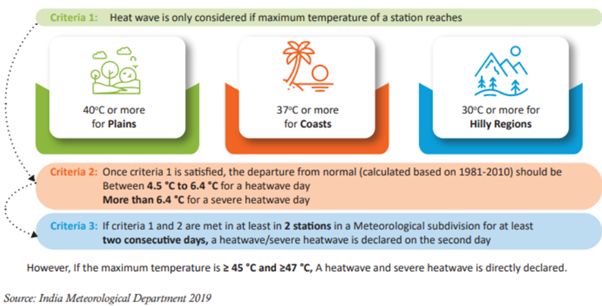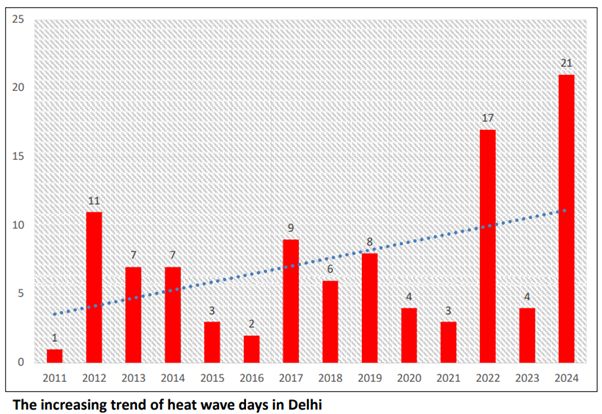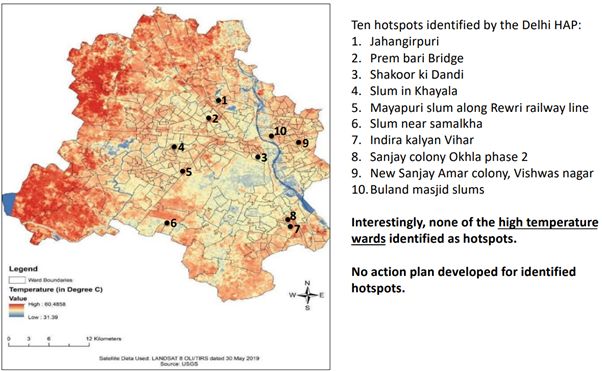
The International Forum for Environment, Sustainability, and Technology (iFOREST), a leading environmental think tank, has released a comprehensive assessment evaluating the effectiveness of Heat Action Plans (HAPs) in addressing this year's unprecedented heatwave crisis. With a particular focus on Delhi, which experienced record-breaking temperatures, the assessment was unveiled during a webinar titled "Why Heat Action Plans failed to save lives? A case study of Delhi."
The study analysed nine city and five district HAPs to identify their strengths and weaknesses in adapting to and mitigating heat risks. The findings revealed significant shortcomings in the current framework and prompted iFOREST to propose a new Heat and Cooling Action Plan (HCAP) to tackle both extreme heat and soaring cooling demands in Indian cities.
Chandra Bhushan, President and CEO of iFOREST, emphasised the need for a fundamental overhaul of Heat Action Plans. "We need a wholesale change in approach to developing Heat Action Plans. While many cities have made noteworthy progress, the fact is that most HAPs are unimplementable. They lack financial and legal backing, as well as an implementation plan," he said.

Key findings of the study
On Heat Action Plans
- Lack of local focus and impact assessment: The study found that HAPs often lack specificity, providing generic recommendations without considering unique local conditions. Critically, most plans failed to assess the broader consequences of heat stress, such as its effects on energy, water, transportation, education, agriculture, and animal welfare, which indirectly impact human health and livelihoods.
- Neglect of urban heat islands and vulnerable populations: Given the heightened heat risks posed by urban heat islands, city HAPs should prioritize identifying and addressing heat hotspots. However, none of the analysed plans included a detailed vulnerability assessment or targeted strategies for these areas and their residents.
- Inadequate resource planning: A significant gap in the HAPs is the absence of comprehensive planning for the necessary infrastructure, personnel, and financial resources required for implementation.
- Funding shortfalls and implementation challenges: The majority of HAPs lacked concrete funding strategies, relying instead on departments to allocate funds from existing budgets. As these plans often demand substantial investments in infrastructure and personnel, the lack of dedicated financial resources has hindered their implementation.
In Delhi’s Heat Action Plan
Delhi's response to the heatwave crisis has been significantly delayed and inadequate. While other Indian cities implemented Heat Action Plans (HAPs) as early as 2013, Delhi only introduced its first plan in 2023, a full decade later. Moreover, this plan was released at the onset of the heatwave season in April 2024, leaving little time for effective implementation.

“As per the Delhi HAP, the medical and health departments are tasked with keeping emergency wards prepared for people suffering from heat symptoms. However, with no funding provisions and no assessment carried out to estimate the number of such wards that would be required, it is not surprising that the hospitals in Delhi are ill-prepared,” the report says.

The Delhi HAP also falls short by failing to identify and address specific heat hotspots or vulnerable populations. Government departments were ill-equipped to handle the severity of the heatwave, with a crucial high-level meeting convened only after the crisis had peaked. In essence, both the state government and local municipalities were unprepared to effectively mitigate the impacts of the extreme heat.
Recommendations
The research underscores the importance of designating heatwaves as a national disaster within the framework of the Disaster Management Act. This classification would guarantee the allocation of sufficient resources and establish a coordinated strategy for mitigating and responding to heatwaves across the country. The current methodology for determining heatwaves, which solely considers maximum temperature, is inadequate. A more comprehensive approach should incorporate factors such as humidity levels and nighttime temperatures to provide a more accurate assessment of heat-related risks.
In light of the intensifying heat crisis, cooling measures have become indispensable. To address this pressing issue, all ULBs should be encouraged to develop HCAP; currently, less than 2.5% of ULBs have HAPs. Current HAPs need to be improved, and cities should re-do their HAPs to reflect the ground realities and realistically estimate impact and resource requirements.
The National Disaster Management Authority is urged to enhance the existing Heat Action Plan (HAP) guidelines to ensure their effectiveness. Given that a limited number of urban local bodies have implemented HAPs, there is a critical need to promote their development nationwide. Furthermore, existing heat action plans require a substantial revision to accurately reflect current conditions, evaluate potential impacts, and identify necessary resources.
"Heat waves will increase across the country. Most forecasts indicate that with increasing global warming, heat waves will have a devastating impact on health, the economy, and livelihoods. We must prepare for this eventuality as countries are not doing enough to reduce greenhouse gas emissions and hence global warming. Developing a comprehensive HAP will aide in saving lives and livelihoods," said Chandra Bhushan.
/articles/can-india-survive-heat